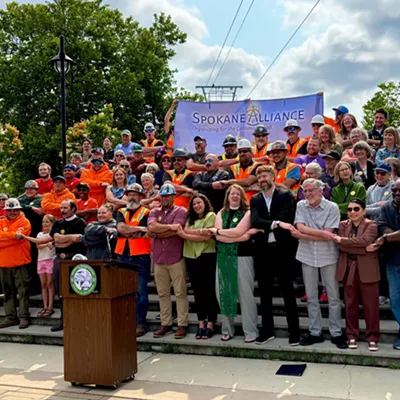Our endless community discussions regarding economic development seem always to produce a predictable to-do list: We need a more effective mayor; or a city council with a vision; or a more aggressive Chamber; a stronger school system; more degrees from WSU; better economic data; a friendlier business environment; more money for human services; settlement of the garage issue; higher-paying jobs. The list goes on.
Do we see a pattern? Apparently we have bought into the idea that we can "manage" our way to prosperity. We can't.
Many American cities, during the boom years of the '80s and '90s, experienced what former Seattle Mayor Charles Royer termed "a moment." But not all cities. While places such as Seattle enjoyed two decades of amazing growth -- and along the way perhaps forgot about all those signs in the early '70s that instructed the last person leaving Seattle to turn out the lights -- many of the Rust Belt cities, those that couldn't take advantage either of the technology boom or location, struggled. Spokane was one of these cities. We missed out on the "moment."
One cause is well understood. Spokane, during the '80s, became a "corporate colony" as merger-mania relocated most of our engines of production and revenue generation. And while some new payrolls moved in, profits went to all those out-of-town corporations. But there was a second cause, not often considered: the decline and fall of national urban policy.
Following the 1950s, a decade of failed public housing and devastating urban renewal programs, LBJ's Poverty Program was implemented. Federal urban policy shifted to direct income transfers and categorical grants: Community Action Agencies, Medicare, Medicaid, Head Start, AFDC, a massive education support act, to name only a few. Some programs succeeded. Many didn't, although the 1980 U.S. Statistical Abstract data show that poverty during the 1960s fell from 22 percent to 11 percent (it is now back to pre-1960s levels).
Richard Nixon came to office in 1968 and declared war on LBJ's bureaucrats and their urban programs. Rather than cut the money, he changed the funding process. Enter block grants and "revenue sharing." The mayors and governors of both parties loved the idea. Cities, including Spokane, became dependent on this form of largess.
The retreat from federal involvement actually began under President Carter, whose commission on urban policy recommended that the government adopt what it termed "locationally neutral" criteria.
A corner had been turned, and there would clearly be winners and losers in this new calculus.
The central city could no longer rely on its historical, cultural, and social importance to influence patterns of support. Distribution of federal largess would reflect people, not place. Those growing population centers, sprawled as they were out in the South and Southwest (both Republican strongholds), could lay claim to ever-larger chunks of money. Older cities, struggling with a range of social problems and shrinking tax bases, were left to fend for themselves.
Enter Ronald Reagan. He took Carter's recommendations, cut off cities, rewarded his Republican base in the South and Southwest, and then proceeded to defund almost everything. HUD saw its budget collapse. A few programs survived -- Head Start, Community Development Block Grants, some public housing, the so-called Enterprise Zones, but not much more. By 1986, revenue sharing was history. Cities were left to make up the difference. Some, because of the by-then booming economy, could. The Spokanes of America could not.
Cities turned to "public-private partnerships." Some succeeded. The wonderful Quincy Market restoration in Boston comes to mind. Former Seattle Mayor Charles Royer, however, once observed that Kevin White, then mayor of Boston, would likely "wind up in jail" were he to cut the same deal today. Indeed, we need not look beyond Spokane to find an example of a partnership that has left a trail of political acrimony and legal action.
While the federal government, and the states -- by then operating in tax-cutting mode -- doled out ever-smaller amounts of support to cities, they continued to pile upon cities an avalanche of largely unfunded mandates and related social responsibilities: Americans with disabilities, deinstitutionalization, group homes, prison work release, poverty, and, most recently, Homeland Security.
To complicate things further, urban problems that appeared to have been conquered during "the moment" are returning. Just ask folks in Seattle. Demographics and the president's unprecedented levels of deficit spending make this trend irreversible in the short term. And our town? We never enjoyed "a moment" in the first place.
We're not living on an island here. Federal policy is a big part of the reason Spokane and lots of other cities continue to struggle economically. So we must look beyond managerial fixes to strategies that address a range of important political and economic issues. Here are but a few:
* The need for a new, comprehensive (and funded) national urban policy that addresses cities as cities, formally recognizes public-private partnerships and provides guiding principles
* No more unfunded mandates
* The impact of corporate colonization (leading to a consideration of "friendlier business environment," which will take us into tax reform)
* Habitat preservation and renewal as critical to the success of any strategy.
These are huge issues, and addressing them in an apolitical culture, with timid politicians and a federal government distracted for the foreseeable future, will not be easy. But a bolder discussion is a good place to start.
Publication date: 04/10/03

















